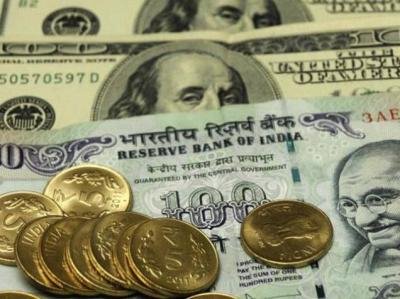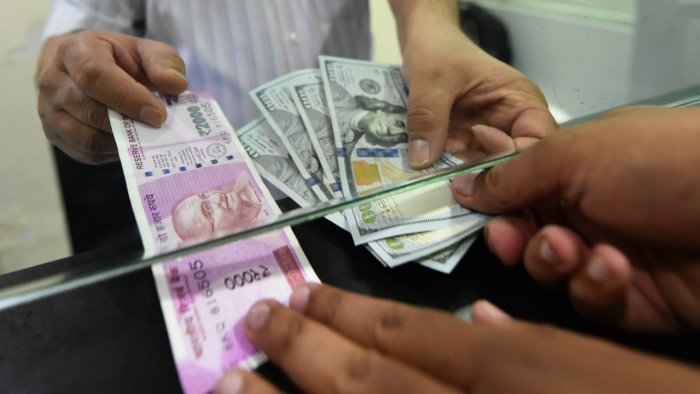India’s Forex Reserves Fall $2.40 Billion to 3-Month Low of $560 Billion
India’s foreign exchange reserves fell by $2.4 billion to a three-month low of $560.02 billion in the week ended April 9, as per the Reserve Bank of India’s (RBI) weekly statistical supplement released on Friday. India’s forex reserves had touched a lifetime high of $590.185 billion in the week ended January 29, 2021. The decline in forex reserves can be attributed to the fall in foreign currency assets (FCAs), which form a key component of the overall reserves. FCAs fell by $2.415 billion to $516.587 billion in the week ended April 9, according to the data.
Meanwhile, the value of gold reserves remained unchanged at $34.68 billion, while India’s special drawing rights with the International Monetary Fund (IMF) increased by $2 million to $1.50 billion. The country’s reserve position with the IMF also rose by $13 million to $4.25 billion.
India’s foreign exchange reserves comprise foreign currency assets, gold reserves, special drawing rights, and the country’s reserve position with the IMF. Forex reserves are crucial as they help the country’s central bank intervene in the foreign exchange market to maintain stability in the currency and to pay for imports.

Why this News is Important?
Impact on Indian Economy and Policy
The fall in India’s forex reserves is a matter of concern as it may lead to depreciation of the Indian rupee against the US dollar, which could further increase the import costs for India. The decline in forex reserves could also impact the country’s credit ratings and the ability to pay for its external debts.
The reduction in forex reserves could also restrict the RBI’s ability to intervene in the foreign exchange market to maintain the stability of the currency. As a result, the RBI may need to consider increasing interest rates to attract foreign investments to boost the forex reserves.
Global Market Volatility
India’s forex reserves play a crucial role in the global financial market, and the decline in reserves may lead to increased volatility in the international financial market. This could result in a significant impact on global investments and trade, leading to uncertainty in the global market.
Historical Context
India’s foreign exchange reserves have been on the rise for the past few years. In January 2018, the reserves had touched an all-time high of $426 billion, which increased to $487 billion in January 2020. The reserves reached a lifetime high of $590.185 billion in the week ended January 29, 2021, due to the surge in foreign investments and increase in foreign portfolio investments.
However, the reserves have been declining in recent months due to several reasons, including a surge in crude oil prices, which has led to higher import bills, and the COVID-19 pandemic, which has impacted the global economy and the country’s exports.
Key Takeaways from “India’s Forex Reserves Fall $2.40 Billion to 3-Month Low of $560 Billion”
| S.No. | Key Takeaway |
|---|---|
| 1. | India’s foreign exchange reserves fell by $2.4 billion to a three-month low of $560.02 billion in the week ended April 9, as per the Reserve Bank of India’s (RBI) weekly statistical supplement. |
| 2. | The decline in forex reserves can be attributed to the fall in foreign currency assets (FCAs), which form a key component of the overall reserves. |
| 3. | India’s forex reserves comprise foreign currency assets, gold reserves, special drawing rights, and the country’s reserve position with the IMF. |
| 4. | The fall in India’s forex reserves is a matter of concern as it may lead to depreciation of the Indian rupee against the US dollar, which could further increase the import costs for India. |
| 5. | The reduction in forex reserves could also restrict the RBI’s ability to intervene in the foreign exchange market to maintain the stability of the currency. |
Important FAQs for Students from this News
Q: What are foreign exchange reserves?
A: Foreign exchange reserves are assets held by a central bank in foreign currencies.
Q: Why are foreign exchange reserves important for a country?
A: Foreign exchange reserves provide a cushion against economic shocks, and they also enable a country to intervene in the foreign exchange market to maintain the stability of its currency.
Q: What are the components of India’s forex reserves?
A: India’s forex reserves comprise foreign currency assets, gold reserves, special drawing rights, and the country’s reserve position with the IMF.
Q: Why did India’s forex reserves fall in the week ended April 9?
A: India’s forex reserves fell due to a decline in foreign currency assets.
Q: What could be the impact of the fall in India’s forex reserves?
A: The fall in India’s forex reserves could lead to a depreciation of the Indian rupee against the US dollar, which could increase import costs for India.
Some Important Current Affairs Links


















 Exciting News!
Exciting News!  Join Our Telegram Channel Now!
Join Our Telegram Channel Now!
 Join our Telegram channel for a thrilling adventure into the world of daily current affairs.
Join our Telegram channel for a thrilling adventure into the world of daily current affairs. 
 Don’t miss out on the latest updates and insights! Click to join now and be part of the knowledge revolution!
Don’t miss out on the latest updates and insights! Click to join now and be part of the knowledge revolution! 
